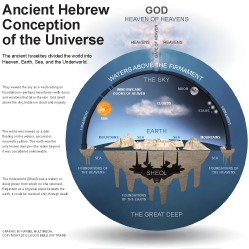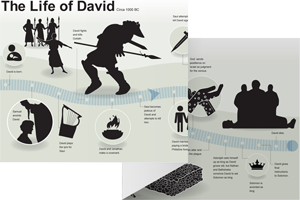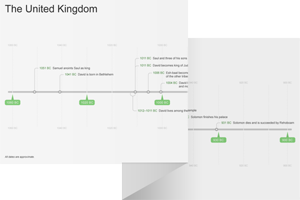2:1–9 David’s final instructions to Solomon signal a transfer of power and set the stage for the establishment of Solomon’s throne (1 Kgs 2:13–46). Verses 3–4 echoes Deuteronomy (e.g., Deut 4:29, 40; 6:5; 10:12; 17:14–20) and refers to the Davidic covenant |
2:2 I am about to go the way of all the world A euphemism for death; also found in Joshua’s farewell address (Josh 23:14).
be courageous The Philistines used this same phrase to encourage themselves in fighting the Israelites (1 Sam 4:9). It serves as an informal call to be strong and courageous.
2:3 the law of Moses The Historical Books (Joshua—Nehemiah) attribute the “Book of the Law” mentioned in Deuteronomy and the laws therein to Moses himself (Deut 28:61; 29:21; 30:10; 31:26). The title “Law of Moses” is the most consistently used title for this collection of laws (see Josh 8:31–32; 2 Kgs 23:25; 2 Chr 23:18; 30:16; Ezra 3:2; 7:6; compare Dan 9:11–13; Mal 4:4).
2:4 your sons The Hebrew terminology used here can refer to David’s 17 sons or to all of his descendants. In this context, the broader meaning is probably intended.
soul Typically translated as “soul,” the Hebrew word used here, nephesh, refers to a person’s inner being or emotional self. Rather than sharply distinguish between soul and body, the ot understands nephesh and the body as an integrated whole. See note on Gen 1:20–25.
take heed of God’s promise to David through Nathan did not include stipulations (2 Sam 7:11–16). However, 1 Kings makes several references to the conditional nature of the covenant (1 Kgs 8:25; 9:5–7).
(1 Kgs 8:25; 9:5–7).
2:5 Joab The commander of David’s army who aligns with Adonijah (1 Kgs 1:7). Joab also was David’s nephew. See 2 Sam 8:16; 20:23.
of David’s army who aligns with Adonijah (1 Kgs 1:7). Joab also was David’s nephew. See 2 Sam 8:16; 20:23.
Abner Saul’s commander and the companion of Saul’s son, Ishbaal. Joab had Abner killed in revenge for the slaying of his brother (2 Sam 2:18–23; 3:27).
Amasa One of David’s nephews (1 Chr 2:17). He supported Absalom (2 Sam 17:25) but later was appointed as one of David’s army commanders (2 Sam 19:13–14). Joab killed Amasa—his personal rival—during the rebellion of Sheba (2 Sam 20:9–10).
in a time of peace Abner and Amasa were at peace with David when Joab killed them, making Joab accountable for both murders (see Gen 9:6; Exod 21:12; Lev 24:17; Num 35:31).
2:6 your wisdom Solomon’s wisdom is praised throughout the narrative (1 Kgs 2:9, 3, 5, 10). David’s mention of Solomon’s wisdom foreshadows ch. 3.
to Sheol By using the noun she’ol, the Hebrew text here refers to the abode of the dead.
 Old Testament Theology of the Afterlife
Old Testament Theology of the Afterlife
Sheol is described as a dark (Job 17:16; Lam 3:6), dusty (Psa 7:5; Job 17:16; 21:26), and silent (Pss 31:17–18; 94:17; 115:17; Isa 47:5) place to which a person descends after death (Num 16:30; Job 7:9; Isa 57:9). This description resembles Mesopotamian conceptions of the underworld. Sheol is said to have gates (Job 38:17; Isa 38:10) and is spoken of as the place of no return (Job 7:9). However, Yahweh is capable of bringing a person out of Sheol (1 Sam 2:6; Amos 9:2). The ancient Greek translation, the Septuagint, normally translates the Hebrew word sheol into Greek as hades (compare note on 1 Pet 3:19). |
2:7 Barzillai A wealthy, elderly man who was hospitable to David during his stay in Gilead and refused compensation (2 Sam 17:27–29). Chimham, Barzillai’s son, accompanied David to Jerusalem and stayed in his court (2 Sam 19:32–40).
2:8 Shimei A man who publicly cursed David for killing members of Saul’s family (2 Sam 16:5–13). David later swore that he would not kill Shimei; he likely made this promise because Shimei approached him with 1,000 men from the tribe of Benjamin (2 Sam 19:16–23). Solomon would not have been bound to this oath (see 2 Sam 19:23 and note).
the son of the Benjaminite Refers to the smallest of Israel’s 12 tribes. Benjamin was allotted territory just north of Judah, Israel’s largest tribe and the tribe of David.
2:9 with blood In using the word bedam (see 1 Kgs 2:6), David suggests that Solomon’s wisdom should lead to Shimei’s violent death.
2:10 slept with his ancestors An idiom meaning “died peacefully.” It also can have a literal meaning, denoting burial in a family plot (e.g., Gen 47:29–30).
was buried in the city of David Royal tombs just outside Jerusalem were used by the Davidic dynasty until the reign of Manasseh (2 Kgs 21:18).
just outside Jerusalem were used by the Davidic dynasty until the reign of Manasseh (2 Kgs 21:18).
the city of David David had renamed the stronghold of Jerusalem the “city of David” after displacing the Jebusites (2 Sam 5:6–10). He also fortified the city from the Millo inward.
inward.
2:11 Hebron David’s first capital city, when he ruled only Judah. After he became king over all Israel, he made Jerusalem the capital (2 Sam 5:5).
2:12 his kingdom was firmly established The Hebrew phrase used here is repeated in 1 Kgs 2:46 after David’s instructions have been carried out, forming a literary structure called an inclusio (or envelope structure).
2:13–46 Solomon begins his reign by killing Adonijah (vv. 13–25), expelling Abiathar the priest (vv. 26–27), and carrying out David’s final instructions regarding Joab (vv. 28–35) and Shimei (vv. 36–46). In eliminating the competition and avenging his father, Solomon establishes his throne and asserts his competency as king. |
2:13 you coming in peace Implies that the tension between Solomon and Adonijah has not been resolved. Furthermore, the mention of both Haggith and Bathsheba may also imply that tensions exist between the two mothers.
and Bathsheba may also imply that tensions exist between the two mothers.
2:15 had set their face toward me The Hebrew idiom used here (which literally means “set their faces”) conveys expectation, intent, and desire for a certain result (see v. 16 and note).
it was from Yahweh for him Adonijah declares the legitimacy of Solomon’s reign.
2:16 you must not refuse me The Hebrew phrase used here can be translated as “do not refuse my face”; it can also be translated as “do not refuse my expectation” or “desire.” Adonijah uses the idiom to ask that his wish be fulfilled (see v. 15).
2:17 he will give to me Abishag the Shunnamite as wife Adonijah’s motive is suspect and probably represents a move to usurp Solomon’s throne. See note on 1:4.
2:19 bowed down to her King Solomon shows respect to Bathsheba, suggesting she has attained an elevated status. As in 1:11–23, the nature of Bathsheba’s political power is uncertain (see 1:15 and note).
the king’s mother The Hebrew phrase used here, em hammelekh, indicates that the primary context of this scene involves Bathsheba and Solomon’s mother-son relationship. If her political status were primary, the official term “queen mother” would probably be used (gevirah; 15:13).
on his right The seat at the king’s right hand is the highest seat of honor (e.g., Psa 110:1).
2:21 as wife See 1 Kgs 1:4 and note.
your brother The narrator has already reminded the reader that Adonijah is Solomon’s half-brother (v. 13) and the rightful heir to the throne (v. 15).
2:22 Why are you asking Abishag the Shunnamite for Adonijah? Solomon interprets Adonijah’s request as a threat—a rival claim to the kingship. This reaction suggests that Abishag was a concubine in David’s harem (see 1:4 and note).
2:24 as Yahweh lives This phrase signals that a formal oath will follow.
will follow.
as he promised Yahweh does not explicitly promise to establish Solomon’s house. This passage represents the view that Solomon embodies God’s fulfillment of the promise to David, despite the ambiguity of the promise itself (2 Sam 7:11–16).
2:25 Benaiah Commander of David’s mercenary troops (2 Sam 20:23; 23:20–23; 1 Kgs 1:8) whom Solomon sends to kill Adonijah, Joab (v. 35), and Shimei (v. 46).
2:26 Anathoth A Levitical city in the territory of Benjamin (Josh 21:18), about three miles northeast of Jerusalem. Centuries later, it was the hometown of the prophet Jeremiah (Jer 1:1).
(Jer 1:1).
you deserve to die Presumably for aligning himself with Adonijah.
you carried the ark of the Lord Yahweh Abiathar and Zadok, both high priests, carried the ark of the covenant to Jerusalem at David’s command (2 Sam 15:24–29).
you endured hardship in all the hardship that my father endured Abiathar had joined David after escaping from Nob (1 Sam 22:20–23) and remained faithful until David’s death.
2:27 thus fulfilling the word which Yahweh Abiathar was the last descendant of Eli, whose priestly line fell out of favor with God. A man of God had prophesied that Eli’s house would lose power and eventually vanish (1 Sam 2:31). Here, this prophecy is fulfilled, signaling the rise of the line of Zadok.
2:28 had not supported Absalom Emphasizes Joab’s loyalty to David.
the horns of the altar See note on 1 Kgs 1:50.
2:29 the tent of Yahweh See note on 1:39.
fall upon him Earlier, Solomon had granted Adonijah sanctuary (1:50–53). His decision to not spare Joab implies that Solomon considered him a greater threat.
2:33 for his house The contrast between the house of Joab and the house of David suggests that the tension between the king and his commander ran deeper than the narrative reveals.
2:34 in his house House burials were common throughout Canaan, but they appear to have been reserved for important leaders in ancient Israel, including Samuel (1 Sam 25:1). Despite being executed, Joab is granted an honorable burial.
were common throughout Canaan, but they appear to have been reserved for important leaders in ancient Israel, including Samuel (1 Sam 25:1). Despite being executed, Joab is granted an honorable burial.
2:35 over the army Benaiah previously worked alongside Joab as the commander of mercenary forces. Benaiah’s status resulted in him taking Joab’s position upon Joab’s death.
Zadok the priest in place of Abiathar Zadok and Abiathar were co-high priests before Abiathar was expelled (2 Sam 8:17; compare note on 1 Kgs 2:27).
2:37 the Wadi Kidron To get to his home in Bahurim (v. 8), Shimei would have to cross the Wadi Kidron, Jerusalem’s eastern border. Instead of killing Shimei as David had instructed (v. 9), Solomon essentially puts him under house arrest in Jerusalem.
2:39 Achish David was a mercenary to Achish while hiding from Saul in Philistia (1 Sam 21:10–14). The two later became allies (1 Sam 27:2–12; 28:1–2; 29:2–9).
Gath A Philistine city on the coastal plain, southwest of Jerusalem. Gath appears five times in a three verses (1 Kgs 2:39–41), indicating the importance of the location to the plot.
appears five times in a three verses (1 Kgs 2:39–41), indicating the importance of the location to the plot.
2:41 Shimei had gone Solomon might have interpreted Shimei’s journey as an attempt to gather support for a rebellion.
2:42 you go anywhere whatsoever This seems to reflect a broader restriction than Solomon’s command in v. 37, which prohibited Shimei from crossing the brook of Kidron.
2:43 the oath of Yahweh Deities served as witnesses to oaths between people in the ancient Near East. Although Solomon indicates here that Shimei had sworn an oath, the earlier dialogue does not reflect this (vv. 36–38).
between people in the ancient Near East. Although Solomon indicates here that Shimei had sworn an oath, the earlier dialogue does not reflect this (vv. 36–38).
2:45 King Solomon will be blessed Solomon’s self-benediction may be an attempt to counteract Shimei’s curse. See 2 Sam 16:5–13.
2:46 So the kingdom was established With all potential internal threats eliminated, Solomon now possesses full control over Israel. This phrase ends the literary unit that began in 1 Kings 2:12 (see v. 12 and note).
King | Date |
Saul | 1051–1011 bc |
David | 1011–971 bc |
Solomon | 971–931 bc |

|
About Faithlife Study BibleFaithlife Study Bible (FSB) is your guide to the ancient world of the Old and New Testaments, with study notes and articles that draw from a wide range of academic research. FSB helps you learn how to think about interpretation methods and issues so that you can gain a deeper understanding of the text. |
| Copyright |
Copyright 2012 Logos Bible Software. |
| Support Info | fsb |
 Loading…
Loading…


 Sheol
Sheol 


